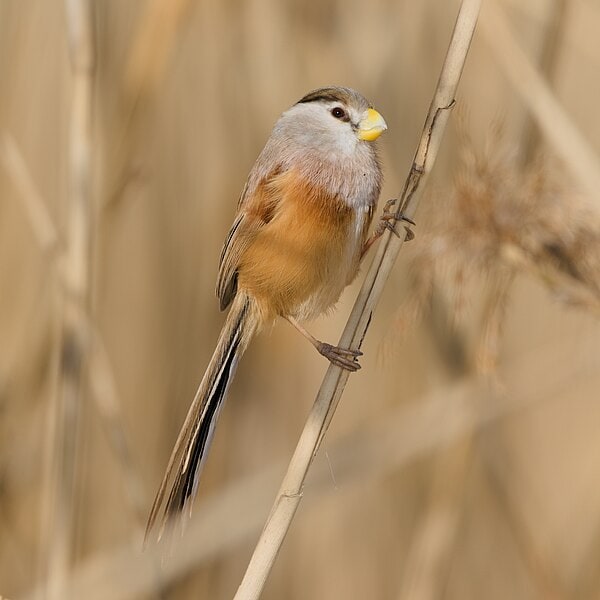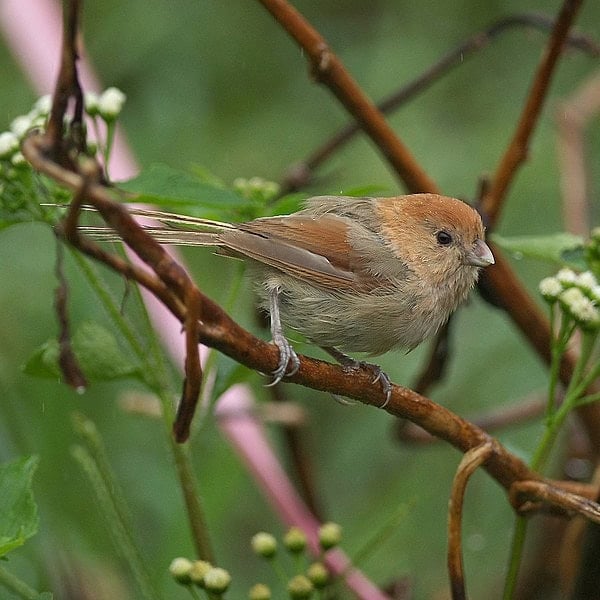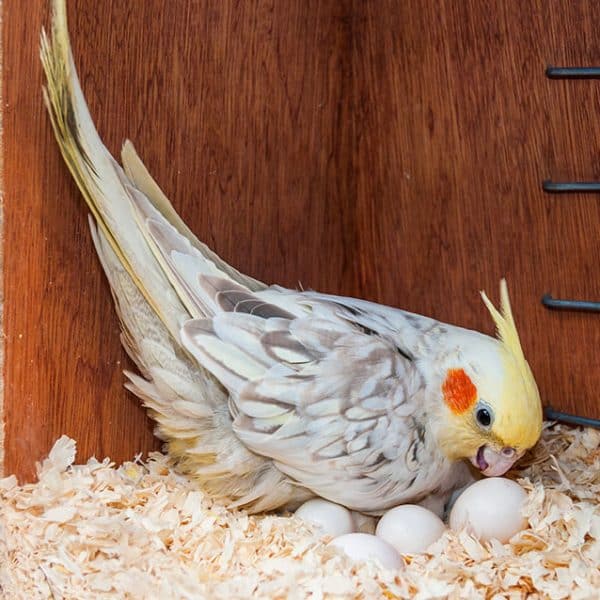Last Updated on by Mitch Rezman
Scientists have discovered something amazing about baby birds (nestlings) of two parrotbill species: they can figure out if a predator is nearby just by hearing its sounds!
Even though they are too young to fly away or defend themselves, these little birds know when to stay quiet to avoid danger.
Why Is This Important?
Many baby birds don’t survive because predators find their nests and eat them.
Birds have developed different ways to protect themselves, but scientists mostly study how adult birds react to danger.
What about the babies? Can they also sense a threat on their own? This study wanted to find out!
How Did Scientists Test This?
Researchers studied two types of birds:
Reed Parrotbill

Vinous-throated Parrotbill

These birds live in reedbeds in China. Scientists played different sounds near their nests and watched how the baby birds reacted.
The Sounds Played:
-
Sparrowhawk Calls – A dangerous bird of prey that sometimes eats baby birds.
-
Oriental Magpie Calls – Another predator that often eats eggs and nestlings.
-
Oriental Turtle Dove Calls – A harmless bird that doesn’t threaten nestlings.
-
Background Noise – Random sounds to compare reactions.
What Did the Baby Birds Do?
-
When they heard Sparrowhawk or Magpie sounds, they stopped begging for food.
-
When they heard Turtle Dove sounds or background noise, they kept calling for food as usual.
-
The Sparrowhawk’s call made the baby birds the quietest—they knew it was extra dangerous!
This means the nestlings can tell the difference between scary predators and harmless birds just by sound—without any help from their parents!
Why Is This So Cool?
-
It helps baby birds survive. If they beg loudly when a predator is nearby, they could get eaten!
-
They don’t need parents to warn them. Even if the parents are away, they can react to danger on their own.
-
It shows how smart animals are. Even tiny nestlings have built-in survival skills!
Final Thoughts
This study proves that even baby birds have ways to protect themselves! They might not be able to fly or fight back, but they listen carefully and know when to stay silent. Next time you hear birds chirping, remember—they might also be listening for danger!
Why Is This Important?
- Chirping too much can attract predators. If a nestling makes noise when a predator is near, it could get eaten!
- Some birds are naturally born with survival skills. Even without their parents around, these baby birds know how to react.
- It helps us understand how animals avoid danger. Just like some animals freeze or run when scared, these birds stay quiet to stay safe.
Can Baby Birds Tell Which Predators Are More Dangerous?
Yes! The nestlings reacted even more strongly to sparrowhawk calls than magpie calls. Scientists think this could be because:
- Sparrowhawks are rare, so the sound is unfamiliar. The baby birds might react more strongly because they don’t recognize the sound.
- Birds of prey have a special type of sound. Animals might naturally be more afraid of these types of calls.
- Their parents might have passed on knowledge. Even though predators stay quiet when hunting, adult birds might recognize their sounds and somehow pass that awareness to their babies.
How Do Baby Birds Learn About Danger?
Scientists think baby birds might learn in two ways:
- Innate Behavior (Instincts): Some animals are born knowing how to react to threats. Since sparrowhawks are rare in the study area, the baby birds probably reacted instinctively.
- Learning From Others: Some animals watch their parents or other birds to learn about danger. However, scientists aren’t sure if these baby birds learned about magpie sounds from adults or if they figured it out on their own.
What’s Next?
This study proved that baby birds can tell the difference between predator and non-predator sounds, but scientists still have questions:
- Can nestlings see and recognize predators, or do they rely only on sound?
- Do nestlings react to predator sounds if they have never faced danger before?
- How much of their behavior is instinct and how much is learned?
By answering these questions, scientists can better understand how baby birds—and maybe other animals—protect themselves from danger!
Final Thoughts
Even though they are small and helpless, baby birds have smart survival skills! They don’t need to see a predator to know it’s dangerous. Just by listening, they can tell when it’s time to be quiet, keeping them safe in their nests.
Nature is full of amazing survival tricks—what other animals do you think have cool ways to stay safe?
Written by Mitch Rezman and the Windy City Parrot content team
Author Profile
Latest entries
 Feeding Exotic BirdsDecember 29, 2025How to Switch or Convert Your Bird From Seeds to Pellets: Real-Life Case Studies and Practical Guidance
Feeding Exotic BirdsDecember 29, 2025How to Switch or Convert Your Bird From Seeds to Pellets: Real-Life Case Studies and Practical Guidance Feeding Exotic BirdsDecember 16, 2025A Practical, Budget-Smart Guide to Feeding Birds Well
Feeding Exotic BirdsDecember 16, 2025A Practical, Budget-Smart Guide to Feeding Birds Well Bird EnviornmentsDecember 7, 2025Understanding Budgie Cage Bar Orientation: Myths, Realities & Practical Solutions for Vertical-Bar Bird Cages
Bird EnviornmentsDecember 7, 2025Understanding Budgie Cage Bar Orientation: Myths, Realities & Practical Solutions for Vertical-Bar Bird Cages Feeding Exotic BirdsDecember 5, 2025How Dr. T.J. Lafeber Rewrote the Future of Pet Bird Nutrition
Feeding Exotic BirdsDecember 5, 2025How Dr. T.J. Lafeber Rewrote the Future of Pet Bird Nutrition


